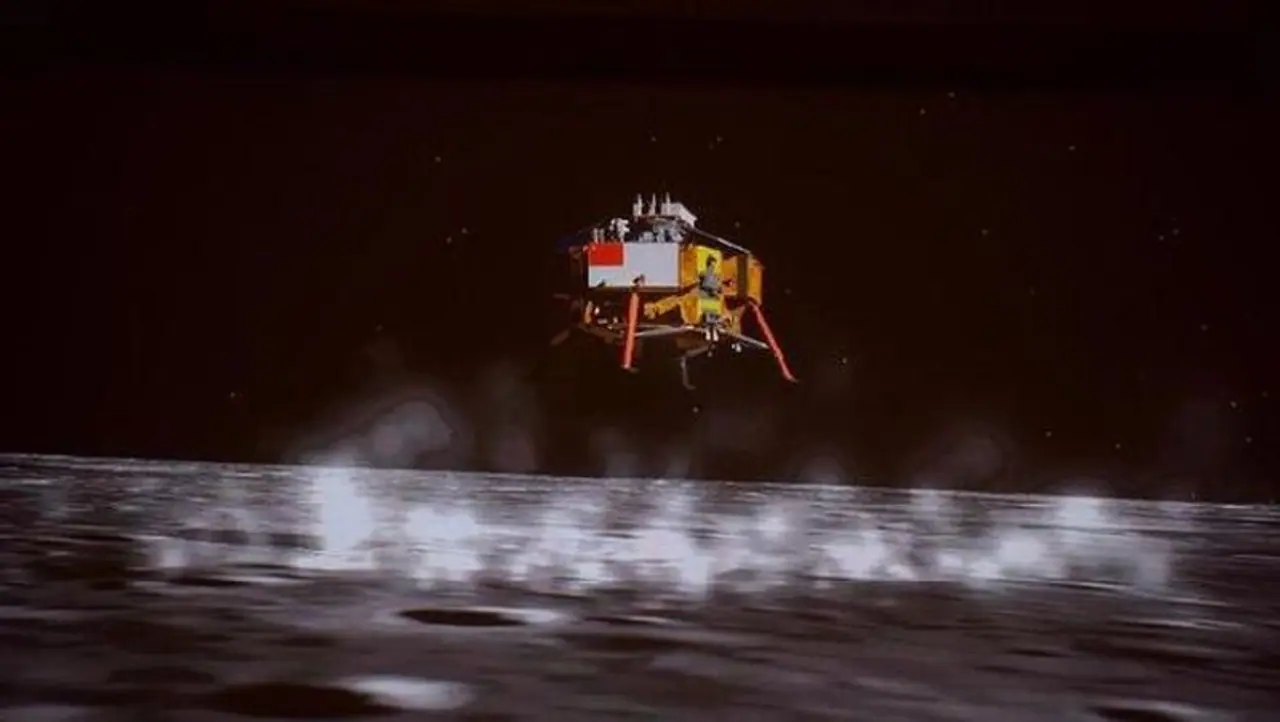China Chang'e-5 lands on the Moon to collect lunar samples
China's Chang'e-5 probe -- the country's sixth lunar mission -- has land on Moon's surface 44 years after the Soviet Union's Luna 24 mission brought back extraterrestrial material in 1976.

<p>The Chang'e-5 lander initiated a powered descent at 8.28PM IST and successfully completed its soft landing near Mons Rümker in Oceanus Procellarum 15 minutes later.</p>
The Chang'e-5 lander initiated a powered descent at 8.28PM IST and successfully completed its soft landing near Mons Rümker in Oceanus Procellarum 15 minutes later.

<p>Chang'e-5's solar-powered lander will collect about 2 kilograms (4.4 pounds) of lunar material from the surface, pack it in a vacuum metal container inside the ascender and return to Earth.</p>
Chang'e-5's solar-powered lander will collect about 2 kilograms (4.4 pounds) of lunar material from the surface, pack it in a vacuum metal container inside the ascender and return to Earth.
<p>The lander-rover combination made an engine-assisted touchdown on the moon and later conduct its task using a cutting-edge drill to obtain underground rocks from 2 meters beneath the surface and a mechanical arm to gather surface dirt.<br /> </p>
The lander-rover combination made an engine-assisted touchdown on the moon and later conduct its task using a cutting-edge drill to obtain underground rocks from 2 meters beneath the surface and a mechanical arm to gather surface dirt.
<p>The lander will also use its three scientific payloads to carry out survey and measurement -- the panoramic camera will map the topography of the landing site; the infrared spectrometer will determine the physical composition of stones and dirt around the landing site; and the soil measurement instrument will detect and analyze the subsurface structure of the drilling point.</p>
The lander will also use its three scientific payloads to carry out survey and measurement -- the panoramic camera will map the topography of the landing site; the infrared spectrometer will determine the physical composition of stones and dirt around the landing site; and the soil measurement instrument will detect and analyze the subsurface structure of the drilling point.
<p>After the two-day surface operations are done, the ascender's rocket will elevate it to lunar orbit to rendezvous and dock with the re-entry module. It will transfer lunar samples to the module and then undock from the latter.</p>
After the two-day surface operations are done, the ascender's rocket will elevate it to lunar orbit to rendezvous and dock with the re-entry module. It will transfer lunar samples to the module and then undock from the latter.
<p>The combination of orbiter and re-entry capsule will then depart the lunar orbit and return to Earth's orbit, where the pair will break up and the re-entry capsule will conduct a host of complicated maneuvers to return to a preset landing site in North China's Inner Mongolia autonomous region in mid-December.</p>
The combination of orbiter and re-entry capsule will then depart the lunar orbit and return to Earth's orbit, where the pair will break up and the re-entry capsule will conduct a host of complicated maneuvers to return to a preset landing site in North China's Inner Mongolia autonomous region in mid-December.
<p>Pei Zhaoyu, spokesman for the Chang'e 5 mission, said if the mission is successful, it will be a milestone in the nation's lunar exploration endeavor and will show the world China's scientific, technological and engineering capabilities.</p>
Pei Zhaoyu, spokesman for the Chang'e 5 mission, said if the mission is successful, it will be a milestone in the nation's lunar exploration endeavor and will show the world China's scientific, technological and engineering capabilities.
<p>Furthermore, Chang'e 5 will strengthen China's status and influence in the international space community, pave the way for the country's future lunar expeditions and boost its space science, and will offer more opportunities to lunar researchers around the world, he said.</p>
Furthermore, Chang'e 5 will strengthen China's status and influence in the international space community, pave the way for the country's future lunar expeditions and boost its space science, and will offer more opportunities to lunar researchers around the world, he said.
Find the latest Technology News covering Smartphone Updates, AI (Artificial Intelligence) breakthroughs, and innovations in space exploration. Stay updated on gadgets, apps, and digital trends with expert reviews, product comparisons, and tech insights. Download the Asianet News Official App from the Android Play Store and iPhone App Store for everything shaping the future of technology.